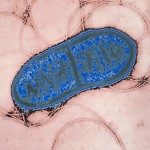Link to Pubmed [PMID] – 24296671
Link to DOI – 10.1128/JB.01109-13
J Bacteriol 2014 Feb; 196(4): 762-71
Integrons play a major role in the dissemination of antibiotic resistance genes among bacteria. Rearrangement of gene cassettes occurs by recombination between attI and attC sites, catalyzed by the integron integrase. Integron recombination uses an unconventional mechanism involving a folded single-stranded attC site. This site could be a target for several host factors and more precisely for proteins able to bind single-stranded DNA. One of these, Escherichia coli single-stranded DNA-binding protein (SSB), regulates many DNA processes. We studied the influence of this protein on integron recombination. Our results show the ability of SSB to strongly bind folded attC sites and to destabilize them. This effect was observed only in the absence of the integrase. Indeed, we provided evidence that the integrase is able to counterbalance the observed effect of SSB on attC site folding. We showed that IntI1 possesses an intrinsic property to capture attC sites at the moment of their extrusion, stabilizing them and recombining them efficiently. The stability of DNA secondary structures in the chromosome must be restrained to avoid genetic instability (mutations or deletions) and/or toxicity (replication arrest). SSB, which hampers attC site folding in the absence of the integrase, likely plays an important role in maintaining the integrity and thus the recombinogenic functionality of the integron attC sites. We also tested the RecA host factor and excluded any role of this protein in integron recombination.






